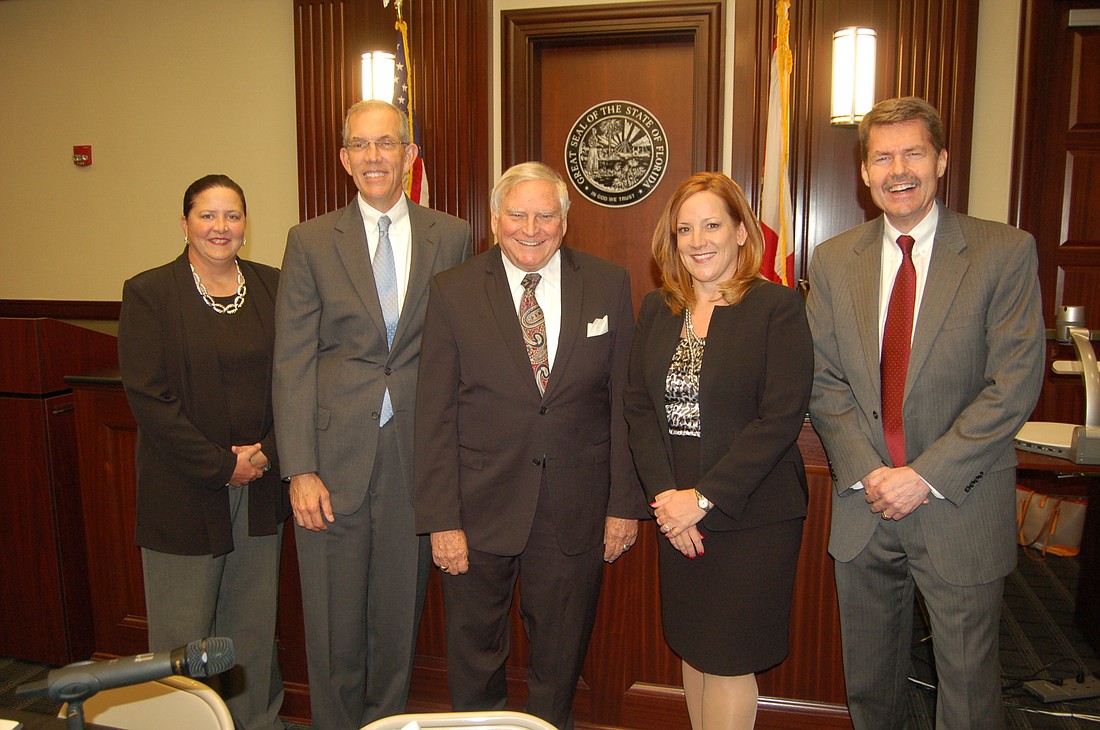
The 1st District Court of Appeal, based in Tallahassee, convened in Jacksonville last week to hear oral arguments in three cases on appeal from the 4th Judicial Circuit.
On Wednesday, the four visiting judges took some time away from the bench to meet Jacksonville Bar Association members for a “sidebar luncheon” at the Duval County Courthouse.
The event has become a tradition over the past several years, said Diana Johnson and William Graessle, co-chairs of The JBA Appellate Practice Committee.
In addition to offering CLE credit, it’s an opportunity for lawyers to meet and talk to the appellate judges, said Graessle.
Johnson said interacting with the judges outside of the courtroom can help attorneys learn how to best present their cases to the court.
“We’re always told to write to our audience. How do you know how to do that if you don’t know the judges?” she said.
The panel comprised Judges Harvey Jay, Scott Makar, Lori Rowe and M. Kemmerly Thomas. They were joined by Jon Wheeler, clerk of the 1st District Court.
Topics for discussion ranged from technical matters to the judges’ perceptions of how serving on the appellate bench differs from their previous roles.
On the subject of the legal system’s ongoing transition from paper to electronic documents, it was a split decision from the bench.
The convenience of his iPad appeals to Jay, who said, “I can carry everything with me and I can scroll seamlessly through the briefs.”
Makar concurred, citing the ability to link to other documents, such as summaries, when he reads electronic briefs.
Thomas prefers paper documents.
“I’m old-school,” she said. “Although a lot of colleagues read on the iPad, I like to hold it in my hand.”
Rowe uses both formats, but prefers paper on the bench and “if an issue is thorny, I like to print it out and make my notes,” she said.
On the subject of footnotes, Makar said attorneys should avoid using them because they can’t be viewed on tablets or mobile devices.
“If it’s important enough to put in your opinion, it’s important enough to put in the body (of the document),” Rowe said.
Jay said discretion should be the rule. “Two hundred footnotes can be burdensome, but it can be a good tool.”
For Thomas, she views footnotes as a way to assess an attorney’s understanding of the nuances of a case and why it should be heard by the appellate court.
“I appreciate footnotes,” she said. “It lets me know that you know that a certain tangent might apply in this case. It tells me you realize the overall application of the law.”
On the less technical level, the judges shared their experience in adjusting to serving on the appellate bench.
Thomas, who was in private practice as a board-certified workers’ compensation defense attorney before she was appointed to the bench in June 2016, said she’s had to adjust to the physical work environment.
“It’s very quiet – a cerebral setting,” she said, and added that it’s a change not having to be concerned about billable hours.
Jay said he enjoys having the time to research legal issues and reflect, but as a former judge in the 4th Judicial Circuit, he sometimes misses the interaction with attorneys and juries.
The 1st Appellate District covers 32 counties of North Florida from Duval in the east to Escambia in the west and hears cases from the 1st, 2nd, 3rd, 4th, 8th and 14th circuits.
Wheeler said 19 percent of the cases filed with the court this year were from the 4th circuit.
He also said filings have been declining since 2009, when nearly 7,000 cases were presented to the 1st District. The projection for this year is about 6,000 cases will be filed.
Due to mediation and costs, “we’re down 6 percent in filing this year and last year, but we’ve still got plenty of work,” Wheeler said.
(904) 356-2466